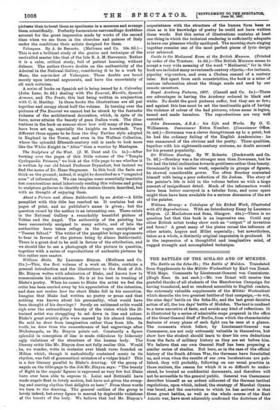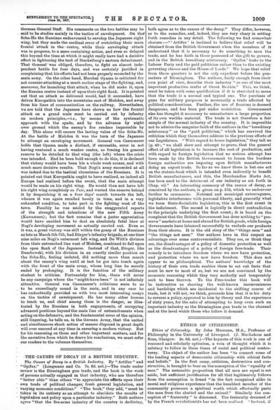THE BATTLES ' OF THE SCHA-HO AND OF MIIKDEN. The
Battle on the Scha-Ro ; The Battle of Mukden. Translated from Supplements to the Milittir Wochenblatt by Karl von Donat. With Maps. Comments by Lieutenant-General von Caeninierer. (Hugh Rees. 6s. net eaoh.)—Mr. von boast will receive the grateful thanks of all students of the Manchurian Campaign for having translated, and so rendered accessible to English readers, the extremely valuable supplements of the Militar Wochenblatt which describe the two greatest battles of that campaign,—to the nine days' battle on the Scha-Ho, and the lest great decisive action of all, the ten days' battle of Haden. The text is confined to a terse narrative of facts, and avoids any kind of reflections. It is illustrated by a series of admirable maps prepared in the office of the Great General Staff of Berlin, from which the characteristic features of every phase of each fight can be seen at a glance. The comments which follow, by Lieutenant-General von Caemmerer, are not only extremely valuable in themselves, but show how the student should Iss,rn to draw his own deductions from the facts of military history as they are set before him. We believe that our own General Staff has been preparing a similar series of studies. But here, as in the case of the official history of the South African War, the Germans have forestalled us, and even when the results of our ,own lueubrations are pub- lished, they, will probably, following on our usual. practice in these matters, the reason for which it is so difficult to under- stand, be treated as confidential documents, and therefore will not be accessible to the general public. General von Caemmerer describes himself as an ardent adherent of the German tactical regulations, upon which, indeed, the strategy of Marshal Oyama was based, and the conviction to which he has arrived is that these great battles, as -well as the whole course of .the East Asiatic war, have most admirably confirmed the doctrines of the
German General Staff. His comments on the two battles may be . said to be studies mainly in the tactics of envelopment. On the. Scha-Ho the Russians endeavoured to envelop the Japanese right wing, but they made the cardinal error of restricting .their main frontal 'attack in the- centre, while their enveloping attack was in progress, to a mere containing action, and even so delayed this beyond the time at which it might really have had a decisive effect in lightening the task of Stackelberg's eastern detachment. That General' was obliged, therefore, to fight an almost inde- pendent battle for four days, and was certainly justified in complaining that his efforts had not been properly seconded by the main army. On the other hand, Marshal Oyama is criticised for not counter-attacking at a much earlier stage of the fighting, and, moreover, for launching that attack, when he did make it, upon the Russian centre instead of upon their right flank. It is pointed out that an attack so delivered would, had it succeeded, have driven Kuropatkin into the mountains east of Mukden, and away from his lines of communication on the railway. Nevertheless, we are told that the Japanese have shown us how the frontal attack on a grand scale must be carried out by infantry on modern principles,—i.e., by means of the systematic approach with the spade, and by the advance by night over ground which the enemy's fire renders impassable by day. This alone will ensure the lasting value of the Scha-Ho. At the battle of Mukden it was the turn of the Japanese to attempt an enveloping movement. General von Caemmerer holds that Oyama made a distinct, if excusable, error in not having ventured a much weaker centre, so freeing his general reserve to be detailed to that wing (the left) where the crisis was intended. Had he been bold enough to do this, it is declared that victory would have been his a whole week sooner, and with much more decisive results. That Nogi's army succeeded at all was indeed due to the teatical clumsiness of the Russians. It is pointed out that Kuropatkin ought to have realised, as indeed all Europe had realised before the event, that the main attempt would be made on his right wing. He would then not have left his right wing completely en rair, and wasted the reserve behind it by despatching it on a four days' march towards the left, whence it was again recalled barely in time, and in a very exhausted condition, to ,take part in the fighting west of the town. Possibly he was misled by the exaggerated reports of the strength and intentions of the new Fifth Army (Kawamura); but the fact remains that a juster appreciation would have enabled him to deal an absolutely fatal blow at Nogi's developing movement as actually carried out. Even as it was, a great victory was still within the grasp of the Russians as late as March 5th-7th, had Burger's infantry brigade, at one time nine miles on Nogi's outermost left wing, and Be Witt's division from their entrenched line west of Mukden, combined to fall upon the open flank of the Japanese. Instead of that, Burger, like Durnbowski, with his division in an exactly similar position on the Scha-llo, feeling isolated, did nothing more than march about the enemy's wing until at last he got into touch again with the front of the main army, whose long line he merely. ended by prolonging. It is the function of the military student to criticise. Fortunately for him, . there will never be any campaign where the "might-have-been" is not infinitely attractive. General von Caammerer's criticisms seem to us , to be exceedingly sound in the main,. and in any case he has undoubtedly provided us with two most interesting essays on the tactics of envelopment. He has many other lessons to teach us, and chief among them is the danger, as illus- trated by the Russians in both engagements, of occupying advanced positions beyond the main line of entrenchments when acting on the defensive, and the fundamental error of the opinion, • still lingering, he tells us, in the German Army, that the united and simultaneous shock action of masses disposed in great depth will ever succeed at any time in ensuring a modern victory. But for his reasoning on these and other important matters, and for the narrative from which he draws his conclusions, we must refer our readers to the volumes themselves.

















































 Previous page
Previous page